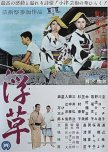One of Ozu's best films; escape to a lazy seaside town
Floating Weeds (1959) showcases Ozu at his peak. This is a top notch film. While it might make sense to watch several other Ozu films beforehand, or even 'A Story of Floating Weeds' (from which Floating Weeds was remade), this film is also great as a first entry into Ozu's film world. Despite its PG rating, it's not an ideal film for young children.
The film plot is more versatile than usual Ozu fare, with more sub-plots, and greater role character involvement. This is still a family drama, but the film's setting in a seaside town (somewhere near Seto Inland Sea) is a departure from the urban environs of many Ozu films, which take place in cities like Tokyo. And, rather than a family under a roof, we have a 'traveling family' here in the form of an acting troupe. The troupe members, like ronin - the wandering samurai of the Shogun-era, are never more than half-anchored to a place. At times, they seem desperate to put down roots but are so easily blown away by their own troubles, insecurities, or economic woes.
For those that enjoy romance, that part of this film is sufficient and enjoyable.
The sets were terrific. Ah, how much I desire to travel to a classic town where this film was made! The dark wood buildings containing eateries, post stores, and barber shops, blend seamlessly with residential space; a customer may be eating noodles at the home entrance room, and the room behind that is the cook's personal living room. This is not a town of commerce, but a place of quiet living, capturing what commerce enters their lazy cove. Business matters are lax. Having visited seaside towns before, there is something quaint, remote, and even nostalgic about these places. They are hiding from society.
The presentation of social life in this seaside town is antithetical to many Ozu settings where the industrial rush is in full display. The economic reality of such a place is not sugar coated either, but the film's place and people feel authentic, carefree, and even romantic. It's the place of quietude we've visited before that we yearn for in our busy lives, or simply never visited but instinctively know we would enjoy such a relaxing pace. In fact, the film's lack of emphasis on city, commerce, and post-war themes, as well as societal changes of the times, made this film feel like a timeless exploration of being human. It was, compared to other Ozu films with a clearer link to societal themes, refreshing to watch "Floating Weeds" without a societal themes commentary/agenda. It had a bit of an escapist feel to it, even for the veteran Ozu viewer.
Part of the humor in this film is that the troupe is not very good. But they're compelled to act together, drink together, and travel together. There's something about this group of semi-outcasts that is endearing. They are imperfect people, willing to backstab one another and then make up a week later, despite not being blood related. They don't feel like co-workers at all.
Machiko Kyo, as Sumiko, was captivating, complex, and convincing. She was, without a doubt, the star of the show despite having the 2nd most prominent role. Her earnestness and desperation is so restrained you can barely tell it is there as she masks it with jealousy, scheming, and cruel words. But we feel the slightest brush of her deepest emotion against our skin; despite a lifestyle of traveling with the wind, Sumiko craves a rooted relationship and won't give that up easily. There is a scene of reconciliation in this film that is simply masterful.
Ozu's style seems to have matured, even peaked in 'Floating Weeds'. I found the storytelling approach to be straightforward with fewer ellipses/gaps. Here, Ozu 'shows' us more of what we are thinking rather than implying action. Personally, I prefer a visual accompaniment as it is something to savor and sensually experience, rather than intellectualize alone in implied action scenes. I'm glad Ozu leaned on this more conventional approach in Floating Weeds.
A terrific film.
The film plot is more versatile than usual Ozu fare, with more sub-plots, and greater role character involvement. This is still a family drama, but the film's setting in a seaside town (somewhere near Seto Inland Sea) is a departure from the urban environs of many Ozu films, which take place in cities like Tokyo. And, rather than a family under a roof, we have a 'traveling family' here in the form of an acting troupe. The troupe members, like ronin - the wandering samurai of the Shogun-era, are never more than half-anchored to a place. At times, they seem desperate to put down roots but are so easily blown away by their own troubles, insecurities, or economic woes.
For those that enjoy romance, that part of this film is sufficient and enjoyable.
The sets were terrific. Ah, how much I desire to travel to a classic town where this film was made! The dark wood buildings containing eateries, post stores, and barber shops, blend seamlessly with residential space; a customer may be eating noodles at the home entrance room, and the room behind that is the cook's personal living room. This is not a town of commerce, but a place of quiet living, capturing what commerce enters their lazy cove. Business matters are lax. Having visited seaside towns before, there is something quaint, remote, and even nostalgic about these places. They are hiding from society.
The presentation of social life in this seaside town is antithetical to many Ozu settings where the industrial rush is in full display. The economic reality of such a place is not sugar coated either, but the film's place and people feel authentic, carefree, and even romantic. It's the place of quietude we've visited before that we yearn for in our busy lives, or simply never visited but instinctively know we would enjoy such a relaxing pace. In fact, the film's lack of emphasis on city, commerce, and post-war themes, as well as societal changes of the times, made this film feel like a timeless exploration of being human. It was, compared to other Ozu films with a clearer link to societal themes, refreshing to watch "Floating Weeds" without a societal themes commentary/agenda. It had a bit of an escapist feel to it, even for the veteran Ozu viewer.
Part of the humor in this film is that the troupe is not very good. But they're compelled to act together, drink together, and travel together. There's something about this group of semi-outcasts that is endearing. They are imperfect people, willing to backstab one another and then make up a week later, despite not being blood related. They don't feel like co-workers at all.
Machiko Kyo, as Sumiko, was captivating, complex, and convincing. She was, without a doubt, the star of the show despite having the 2nd most prominent role. Her earnestness and desperation is so restrained you can barely tell it is there as she masks it with jealousy, scheming, and cruel words. But we feel the slightest brush of her deepest emotion against our skin; despite a lifestyle of traveling with the wind, Sumiko craves a rooted relationship and won't give that up easily. There is a scene of reconciliation in this film that is simply masterful.
Ozu's style seems to have matured, even peaked in 'Floating Weeds'. I found the storytelling approach to be straightforward with fewer ellipses/gaps. Here, Ozu 'shows' us more of what we are thinking rather than implying action. Personally, I prefer a visual accompaniment as it is something to savor and sensually experience, rather than intellectualize alone in implied action scenes. I'm glad Ozu leaned on this more conventional approach in Floating Weeds.
A terrific film.
Questa recensione ti è stata utile?







